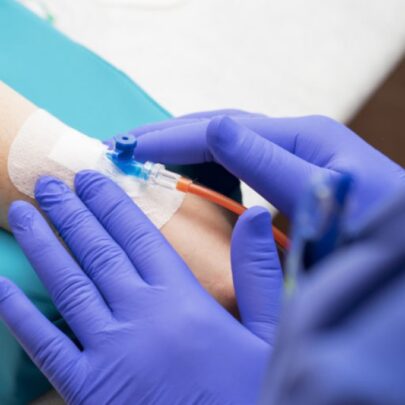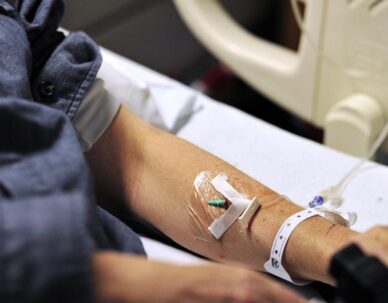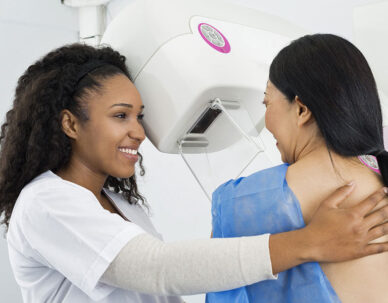Coronavirus Pandemic Accelerates Move to Cancer Care at Home
October 16, 2020
In February 2020, the Penn Center for Cancer Care Innovation (PC3I) and its partners launched a program to demonstrate that many cancer therapies could be safely and effectively administered at home. One month from launch, the program had referred 39 patients for administration of 7 different cancer drugs at home. The next seven weeks saw a 700% increase in home infusion referrals.
The program has recently been featured in:
- New England Journal of Medicine Catalyst paper
- American Cancer Society podcast (Spotify, Apple Podcasts, Stitcher, Soundcloud)
- Oncology Nursing Society podcast (Spotify, Apple Podcasts, Stitcher, Google Play)
- National media (O, The Oprah Magazine, The ASCO Post, Cancer Therapy Advisor, The Philadelphia Inquirer, Chicago Tribune, Philadelphia Style Magazine, Washington Post, WHYY, and OncLive) documenting the rapid acceleration of cancer care at home due to the COVID-19 pandemic.
For several years, Innovation Faculty members at PC3I have been researching new technologies and methodologies to enable a number of cancer treatments, including infused and injected therapies, to be carried out in the home. In early 2019, researchers published a vision for cancer care at home in the Journal of Clinical Oncology. In the fall of 2019, PC3I began putting research into action. We knew administering cancer drugs in the home setting was safe and efficacious. While providing cancer drugs at home is rare in the United States, internationally, a range of cancer treatment regimens have been delivered safely at home across a variety of patient populations. Plus, Penn’s existing home infusion operation, Penn Home Infusion Therapy (PHIT), part of Penn Medicine at Home, had been providing similar treatments for non-cancer indications effectively at home for many years.
PC3I, together with PHIT, the Center for Health Care Innovation, the Division of Hematology and Oncology, and the Cancer Service Line launched the Cancer Care @ Home demonstration program and began referring patients in February 2020.
Any remaining barriers to at-home care came down once COVID-19 hit.
Justin Bekelman, PC3I Director
“Early on, we found that oncologists and patients were understandably resistant to the idea of receiving treatment at home,” PC3I Director Justin Bekelman, MD, shares with The ASCO Post. “We reduced those barriers by addressing their concerns directly; making it easy for physicians to order home infusions and for patients to receive cancer drugs at home; and explaining the safety procedures, credentialing, and training of the nurses providing the care at home. Once we addressed those barriers and started receiving positive feedback from our patients and physicians, we knew the program would get traction.”
As of mid-March, one month from launch, the Cancer Care @ Home program had referred 39 patients with breast cancer, prostate cancer, and lymphoma for administration of dose-adjusted EPOCH or leuprolide with or without zoledronic acid or denosumab.
“We started this program before the outbreak of COVID-19, because we thought it could be a win-win-win for everyone, including patients, Penn Medicine, and payers,” Bekelman shares with The ASCO Post. “The program is even more essential now to continue cancer treatments for patients who are immunocompromised to reduce their risk of infection with the coronavirus, to decrease the density in our infusion suites, and to increase hospital capacity…. Any remaining barriers to at-home care came down once COVID-19 hit, which pushed us to scale the program in just a few weeks.”
Over a seven-week period in late March and April 2020, the program saw an increase in home infusion referrals from 39 to 310. The number of cancer drugs provided at home increased from 7 to 13. The Cancer Care @ Home team is currently exploring about 12 additional cancer medicines for home infusion.
As much as I love Penn, not having to go there gives me peace of mind.
Desiree Harmon, patient
One patient benefiting from the Cancer Care a@ Home program is Desiree Harmon, the middle school director at Friends Select, a Quaker school in Philadelphia. As a breast cancer survivor, she had traveled to Penn every month for five years to receive her leuprolide depot injection, which reduces her chances of recurrence.
“I called it my calendar-killer,” Harmon tells The Philadelphia Inquirer. “I had to work my life around this shot.”

Now, a nurse comes to her Mount Airy home every month to administer the shot. The nurse treating her at home possesses the same certifications and credentials as the one she would see at Penn. Harmon is particularly grateful for this service given the pandemic. She, her husband, and their two children are sheltering at home.
“I kind of freaked out a little bit [about coronavirus] because of having a compromised immune system,” Harmon reveals to The Philadelphia Inquirer. “As much as I love Penn, not having to go there gives me peace of mind.”
“It is important to note there are some types of cancer therapies that must be administered in the outpatient clinic or hospital setting,” Bekelman tells The ASCO Post. “The goal of this program is not to transfer all cancer care to the home setting.”
The program is demonstrating, however, that home cancer treatment can, for the right cancer medicines and patient populations, take the place of inpatient or outpatient cancer treatment, keeping vulnerable cancer patients out of healthcare facilities and freeing up hospital capacity during the pandemic.
Cancer care at home is here to stay.
Justin Bekelman, MD
“This is one of the silver linings of the pandemic,” Penn Medicine Division of Hematology Oncology Chief Lynn Schuchter, MD, tells The Philadelphia Inquirer. “Things we wanted to innovate in cancer care, we’ve been able to do much more rapidly.”
Cancer Care @ Home is protecting the most vulnerable now, and we hope it will become a routine treatment option even after this crisis.
“I believe the measures we are taking to provide cancer care during the pandemic will make our healthcare system stronger and will make cancer care better,” Bekelman shares with The ASCO Post. “The Cancer Care @ Home program is a great example of why we are so passionate about the work we do at the Penn Center for Cancer Care Innovation. We know there will continue to be challenges to scaling the program, but providing cancer care at home is here to stay.”

